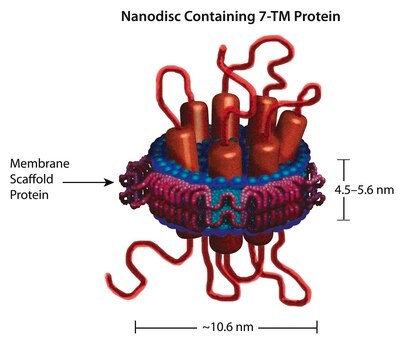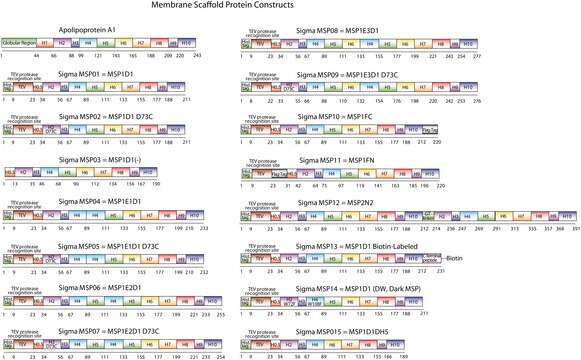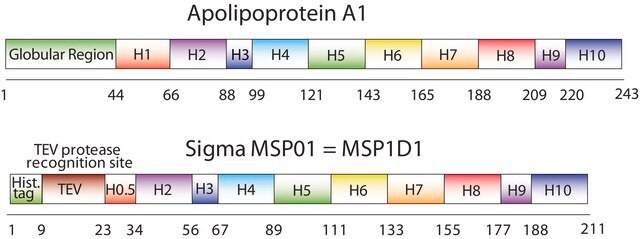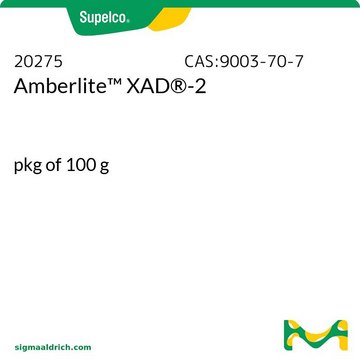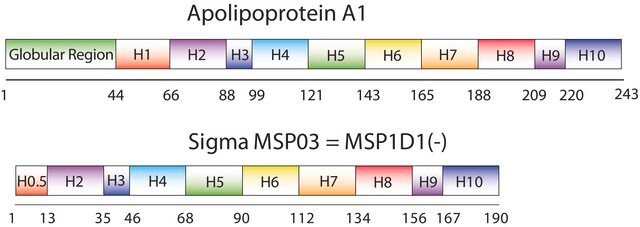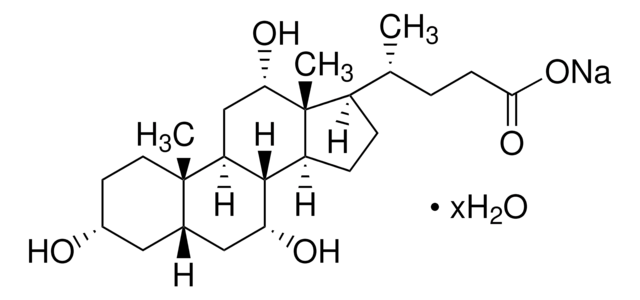Wszystkie zdjęcia(2)
Key Documents
MSP05
Membrane Scaffold Protein 1E1D1 D73C
recombinant, expressed in E. coli, Cysteine substituted at position 73
Zaloguj sięWyświetlanie cen organizacyjnych i kontraktowych
About This Item
Kod UNSPSC:
12352200
NACRES:
NA.26
Polecane produkty
rekombinowane
expressed in E. coli
Poziom jakości
Próba
≥90% (SDS-GE)
Postać
buffered aqueous solution
Warunki transportu
ambient
temp. przechowywania
−20°C
Opis ogólny
Nanodisc technology is an approach to render membrane proteins soluble in aqueous solutions in a native-like bilayer environment, where the membrane proteins remain stable and active. The Nanodisc concept is derived from high density lipoprotein (HDL) particles and their primary protein component, apolipoprotein. The Nanodisc is a non-covalent structure of phospholipid bilayer and membrane scaffold protein (MSP), a genetically engineered protein, which mimics the function of Apolipoprotein A-1 (ApoA-1).
The first MSP, MSP1, was engineered with its sequence based on the sequence of A-1, but without the globular N-terminal domain of native A-1. The MSP1E1D1 D73C variant of MSP1 differs from MSP1 in the following facets:
The first MSP, MSP1, was engineered with its sequence based on the sequence of A-1, but without the globular N-terminal domain of native A-1. The MSP1E1D1 D73C variant of MSP1 differs from MSP1 in the following facets:
- It deletes the first 11 amino acids in the Helix 1 portion (referred to as “H0.5” in the accompanying figure) of the original MSP1 sequence (which is known separately as MSP1D1).
- It repeats the Helix 4 portion (H4) of the original MSP1 sequence between the parent Helix 4 (H4) and Helix 5 (H5) segments of MSP1D1.
- It replaces one aspartic acid residue (D) with a cysteine (C) at position 73 of the original native A-1 sequence, located within the Helix 2 segment (H2).
Zastosowanie
For guidelines on the use of this and other MSP′s to prepare Nanodiscs, please visit our Protocols for Membrane Scaffold Proteins and Nanodisc Formation page.
Informacje prawne
Nanodisc technology, and many of its uses, are covered by the following patents held by the University of Illinois.
- 7,691,414 Membrane scaffold proteins
- 7,662,410 Membrane scaffold proteins and embedded membrane proteins
- 7,622,437 Tissue factor compositions and methods
- 7,592,008 Membrane scaffold proteins
- 7,575,763 Membrane scaffold proteins and tethered membrane proteins
- 7,083,958 Membrane scaffold proteins
- 7,048,949 Membrane scaffold proteins
This page may contain text that has been machine translated.
Kod klasy składowania
12 - Non Combustible Liquids
Klasa zagrożenia wodnego (WGK)
WGK 2
Temperatura zapłonu (°F)
Not applicable
Temperatura zapłonu (°C)
Not applicable
Certyfikaty analizy (CoA)
Poszukaj Certyfikaty analizy (CoA), wpisując numer partii/serii produktów. Numery serii i partii można znaleźć na etykiecie produktu po słowach „seria” lub „partia”.
Masz już ten produkt?
Dokumenty związane z niedawno zakupionymi produktami zostały zamieszczone w Bibliotece dokumentów.
Protokoły
Protocols for Membrane Scaffold Proteins and Nanodisc Formation
Nasz zespół naukowców ma doświadczenie we wszystkich obszarach badań, w tym w naukach przyrodniczych, materiałoznawstwie, syntezie chemicznej, chromatografii, analityce i wielu innych dziedzinach.
Skontaktuj się z zespołem ds. pomocy technicznej
